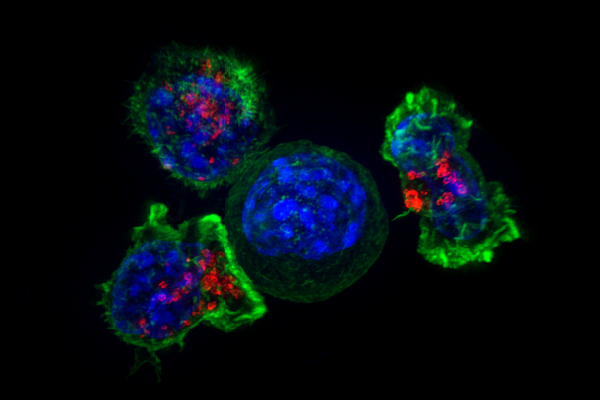Scientists provide proof of concept for potential new class of cancer drugs

A recent study led by scientists at Sylvester Comprehensive Cancer Center at the University of Miami Miller School of Medicine, in collaboration with the Univerity of Maryland School of Pharmacy and StemSynergy Therapeutics, Inc., has identified a small-molecule inhibitor of the Notch pathway, paving the way for a potential new class of personalized cancer medicines. Aberrant activity in the Notch pathway contributes to the initiation and maintenance of cancer stem cells. The study was published online in the journal Cancer Research.
"The Notch pathway is an exceedingly attractive therapeutic target in cancer, but the full range of potential targets within the pathway has been underexplored," said Anthony J. Capobianco, Ph.D., director of the Molecular Oncology Research Program at Sylvester and corresponding author of the study. "To date, there are no small-molecule inhibitors that directly target the intracellular Notch pathway directly. We've been trying to target this pathway for more than15 years and this is the first example of a targeted therapeutic specific for Notch that has an effect on human-derived malignant tumors."
In this study, the team of scientists attacked the core of Notch activity - a complex of three proteins that directs a specific program of transcription critical for the survival of the tumor. In collaboration with Alex MacKerell, Ph.D., director of the Computer-Aided Drug Design (CADD) Center at the Univerity of Maryland School of Pharmacy, the team used computational drug discovery to identify a small-molecule inhibitor, termed Inhibitor of Mastermind Recruitment 1 (IMR-1), that disrupted the recruitment of Mastermind-like protein 1 (Maml1) to the Notch transcription complex - a function that in turn abrogates Notch target gene transcription. More important, IMR-1 inhibited the growth of Notch-dependent cell lines and significantly supressed the growth of patient-derived tumors in mouse xenograft studies.
"CADD offers the potential to identify therapeutic agents for challenging drug targets, including those involved in cancer," said MacKerell. "In this study, we were able to apply CADD to identify potential drug-binding sites on the previously uncharted Notch transcriptional complex and then screen more than one million drug-like compounds to identify those with a high probability of binding to the complex and blocking its function. The success of this approach in identifying the novel Notch inhibitor emphasizes the utility of CADD in jump-starting research efforts toward the development of novel therapeutic approaches to the treatment of cancer and other diseases."
"Our findings suggest that a novel class of Notch inhibitors targeting Maml1 may represent a new paradigm for Notch-based anticancer therapeutics," said Capobianco, who is also professor of surgery at the Miller School. "As a next step, we plan on moving this laboratory research from human-derived disease models to cancer patients over the next years."
More information: Cancer Research, DOI: 10.1158/0008-5472



















